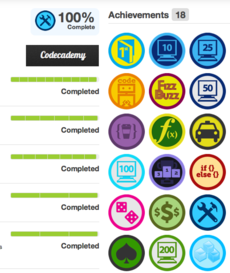
I'm what you might call a tech pseudo-geek, a rather common archetype of the Internet generation.
MS-DOS, dial-up modems and "The Oregon Trail" were staples of my childhood. AOL Instant Messenger was my social stenographer throughout middle school. When I arrived to college in 2004, everyone was raving about a brand new MySpace clone called "TheFacebook."
Despite this lifelong affinity with tech, I have nonetheless kept a safe distance from its true backbone: the miles of incomprehensible code that course through our trusty hardware and give life to our inanimate gadgetry.
In the interest of full disclosure, I'll admit that I have flirted with HTML and CSS, two languages that -- as any decent programmer will remind you -- are child's play.
I have endured a few false starts over the years trying to tackle some of the grittier and more powerful languages such as C, Python, and Ruby. I've struggled to follow everything from print textbooks to YouTube tutorials, eventually tossing up my hands in a bout of frustration and retreating in defeat. Few moments are more dispiriting than staring blankly at an eyeball-searing, monochrome terminal window, attempting to divine where I could have possibly erred amid lines and lines of disparate characters.
My series of failures, however, might finally be coming to an end, thanks to a bevy of new, intuitive browser-based courses that make learning how to code mercifully simple.
Codecademy, launched last summer, is leading the fray with a program called Code Year, a weekly course series that attracted fame when New York Mayor Michael Bloomberg pledged to join the weekly challenge. During Code Year, I can freely start, pause and resume the thoughtfully-designed online lessons, whose completion earns endorphin-triggering medals, badges and other requisite gamification swag. 
Addictive? You bet. And whenever I hit an impenetrable wall of code (i.e. at least once a lesson), a well-populated Q&A forum with novice and expert programmers is one click away.
CodeSchool offers a similar smörgasbord of browser-based tutorials, including one of my personal favorites: Rails for Zombies, which, as you might have guessed, is a zombified walkthrough of the incredibly popular Ruby on Rails framework. Again, the creative implementation of instant gratification and reinforcement makes learning any other way seem hopelessly primitive.
By wrapping the arcane world of programming in a fun and accessible package, these tools have liberated that which once seemed perpetually reserved for the über-nerdy.
The question remains: Why bother at all? Why not just leave the cryptic world of coding to the coders?
As I see it, it's a bit like the world of cars: You'll probably be a better owner and driver if you are at least minimally cognizant of what's happening under the hood. In a world increasingly dependent on technology, our economic productivity - -both individually and collectively -- is increasingly incumbent on our ability to interface fluidly with all things tech.
More broadly, these tools demonstrate new models for instruction at a time when our nation faces a growing crisis in our stressed and antiquated education system. Initiatives like Code for America are poised to inspire a generation of students to pursue science with an enthusiasm not equaled since the Space Race of the 1960s. And while we have successfully leveraged information technology to bring about vast changes in the way we communicate and share ideas in our daily lives, one frontier remains to be revolutionized: the classroom.
With any luck, the tools that are guiding my journey into the worlds of Javascript and Ruby on Rails are the harbingers of that desperately overdue revolution.
An earlier version of this post incorrectly stated that AOL Instant Messenger has been discontinued.